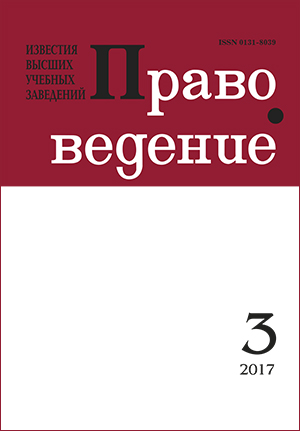Richard Posner and his theory of wealth maximization
Abstract
In this paper, the author analyzes the biography and work of the distinguished American lawyer, judge and scholar Richard Allen Pozner. In describing his biography, an attempt was made to analyze the landmarks of Richard Pozner’s life path which particularly influenced his development as the most cited lawyer in the world. The author considers the circumstances of his family life, educational institutions that he attended, as well as the inclinations and talents that he showed during his career. In analyzing Pozner’s theory of law, the author purports to show how Richard Pozner had developed the well-known wealth maximization theory: from his acquaintance with the Judge Hand’s decision to the appearance of Gary Becker’s economic theory of criminal behavior and the work of Ronald Coase. It explains his view on the theory of normative and positive law which, undoubtedly, differs from the generally accepted approach in the Russian legal tradition. Posner considers the normative theory of law, the wealth maximization theory as a theory of obligation. The evolution of the scientist’s views on the ethics of law is briefly examined. The author makes a detailed study of the differences between Posner’s theory, utilitarianism and Kantianism, the usage of the wealth maximization theory as an alternative legal theory. The article also examines the economic foundations of the wealth maximization theory: the notions of value and wealth, explicit and implicit markets, the Coase theorem, effectiveness criteria in law.
Keywords:
Richard Posner, Aaron Director, Joseph Stigler, Learned Hand, Jeremy Bentham, Gerry Becker, wealth maximization theory, utilitarianism, economic analysis of law, Chicago School of Economic Analysis
Downloads
References
Downloads
Published
How to Cite
Issue
Section
License
Articles of "Pravovedenie" are open access distributed under the terms of the License Agreement with Saint Petersburg State University, which permits to the authors unrestricted distribution and self-archiving free of charge.




